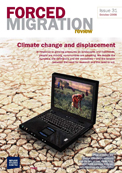(BBC News) March 8, 2012 – Kiribati’s President Anote Tong is in talks to buy 23 sq km (9 sq miles) on Fiji’s Vanua
Levu island.
The land is wanted for crops, to settle some Kiribati farm
ers and to extract earth for sea defences, reports say.
Some of Kiribati’s 32 coral atolls, which straddle the equator, are already disappearing beneath the ocean.
None of the atolls rises more than a few metres above the sea level.
‘Last resort’
Fiji, which is more than 2,000km (1,300 miles) away, is one of a number of countries that Kiribati hopes its population may be able to move to in the future.
The chairman of Fiji’s Real Estate Agents Licensing Board, Colin Sibary, said he was facilitating talks between Kiribati officials and a Fijian freeholder who owns the land on Vanua Levu.
“I’ve been working very hard on this for Kiribati for a year,” Mr Sibary told the BBC.
“After the purchase they will formalise a development plan which will include various farms to produce vegetables, fruit and meat for export to Kiribati.”
He said Kiribati officials also hoped to bring barges into Vanua Levu, Fiji’s second largest island, to take away landfill to help stop encroachment by the sea in Kiribati.
At most,
he thought 500 Kiribati inhabitants might end up living on Vanua Levu, involved in farming and working on the landfill project.
“There is no thought of moving them all,” he said.
President Tong said climate change was a daily battle for Kiribati, but has admitted it is one his country would ultimately lose.
He said moving the Kiribati population would be a “last resort” to save the
more than 100,000 islanders.
Relocating the entire population would be a monumental challenge, says the BBC’s Phil Mercer in Sydney.
Kiribati’s officials hope that many people would also be allowed to settle in other countries in the vast region, including Australia and New Zealand.
Previously, Mr Tong suggested constructing man-made islands resembling oil rigs for people to live on.
Source: BBC News



